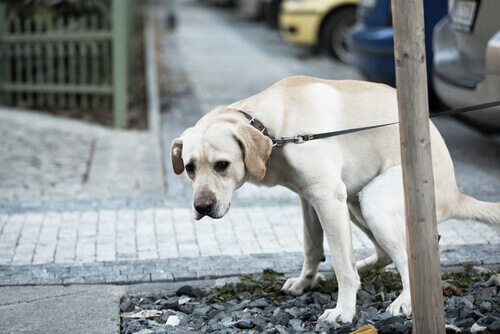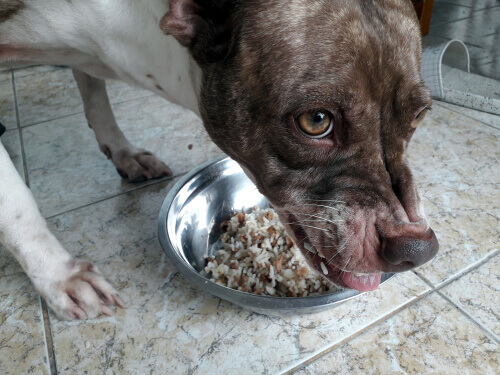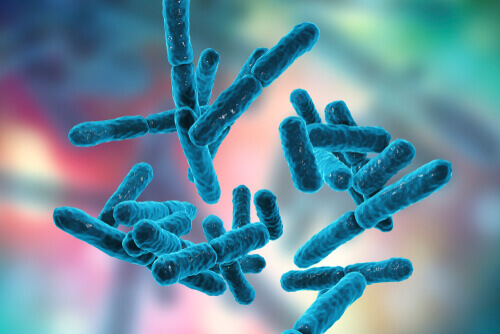Digestive Problems in Dogs: Treatment and Prevention

Digestive problems in dogs cause a great deal of worry among pet owners and veterinarians.
This is especially true regarding digestive disorders that are difficult to treat given the limits of diagnostic procedures and their multiple causes. In the following article, we’ll look at the dietary approach to treating and preventing these issues.
The role of the intestinal microbiota in digestive problems in dogs
Dogs have a unique collection of hundreds of types of unicellular microorganisms inhabiting their digestive tracts. This diversity of microorganisms (bacteria and other microbes) is known as microbiota or intestinal microbiota.
Numerous scientific studies have demonstrated that intestinal microflora is crucial to digestion and obtaining the nutrients the foods offer.
Today, experts recognize that the intestinal microbiota is related to a wide variety of processes. In fact, these range from body weight to mental health, and much more. In other words, the balance of the microbiome affects almost every aspect of a dog’s health and happiness.

What factors can lead to an imbalance in the canine microbiome?
Exposure to any of the following may cause your dog to suffer some degree of digestive problems :
- Antibiotic treatments, anti-inflammatory drugs (NSAIDs), steroids, or antihistamines.
- Treatments for ticks or fleas, or vaccinations.
- Finally, a diet consisting exclusively of commercial food can also lead to digestive problems in dogs.
How to promote a healthy intestinal microbiome?
Fortunately, there are a series of measures you can adopt to assure a balanced intestinal microbiome. In turn, you’ll be preventing digestive problems. For example:
1) Make sure that puppies nurse
A mother’s milk is a puppy’s first and most important natural vaccine. For this reason, it’s vital that puppies receive the variety of nutrients that their mother’s milk contains. For example:
- Growth factors, which induce the proper maturation of the intestine.
- Natural antibiotics, which impede the colonization of pathogens.
- Prebiotics, which promote the growth of beneficial intestinal flora.
2) Allow constant contact with fresh air and nature
The bacteria that are potentially good for your dog are all over the place in nature. For example, in the ground, in plants, and even in the air. Take your dog for a walk and open the windows in your home to let in some fresh air.
3) Provide fresh raw foods
Raw fresh foods are a source of natural microbes for your dog. In fact, some people even give their dogs raw meat. Of course, you should follow certain precautions if you want to try this. As you know, not all the microbes that grow on foods are healthy.
4) Use probiotics and fermented foods
Probiotics are beneficial living microbes that are abundant in fermented foods. Therefore, experts recommend fermented foods as part of a healthy diet.
It’s important to keep in mind that probiotic microbes don’t generally become permanent residents of your dog’s microbiome. Therefore, many owners consider daily supplements to be more beneficial.
5) Consider a fecal matter transplant
Fecal matter transplants have proven to be successful in treating chronic intestinal problems. Here, a dog that suffers from some gastric pathology receives the intestinal microbes of a healthy dog.
In the past, these transplants involved the use of an enema–generally in a veterinary hospital, and with sedation. Therefore, they were expensive and stressful for animals. However, today you can obtain oral capsules that contain fecal microbiota, making the process much easier .

6) Help manage canine stress
Scientific studies have demonstrated that stress disturbs the balance of human beings’ intestinal microbiome. In the same way, the symptoms of digestive problems in dogs can become worse if they suffer stressful situations.
When it comes to relieving stress in dogs, there are a variety of techniques available. For example, increasing your dog’s exercise levels is one of the easiest things you can do.
In conclusion, the dietary management of digestive problems in dogs has two key aspects. First, you need to consider excluding components that could lead to food allergies or sensitivities. Second, look to influence the composition and metabolic activity of your dog’s gastrointestinal microflora.
All cited sources were thoroughly reviewed by our team to ensure their quality, reliability, currency, and validity. The bibliography of this article was considered reliable and of academic or scientific accuracy.
- German, A., & Zentek, J. (2006). Enfermedades digestivas más frecuentes: el papel de la nutrición. Enciclopedia de la Nutrición Clínica Canina (Pibot y col.). Royal Canin, Paris, Francia, 120-131.
- Silva, J. G. (2016). Nutrición hospitalaria práctica para la clínica de pequeños animales Nutrición enteral: estrategias y nutrientes terapéuticos. Revista Colombiana de Ciencia Animal, 9(1).
- Salcedo Reyes, D. (2015). Evaluación de la aplicación de microorganismos benéficos en problemas diarreicos de cachorros Canis lupus familiaris (Bachelor’s thesis, Universidad de Guayaquil. Facultad de Medicina Veterinaria y Zootecnia).
